-
 Bitcoin
Bitcoin $118300
-1.72% -
 Ethereum
Ethereum $3591
-0.69% -
 XRP
XRP $3.478
-3.53% -
 Tether USDt
Tether USDt $1.001
-0.01% -
 BNB
BNB $737.7
-0.54% -
 Solana
Solana $177.3
-2.40% -
 USDC
USDC $0.9999
-0.01% -
 Dogecoin
Dogecoin $0.2538
7.04% -
 TRON
TRON $0.3256
-0.85% -
 Cardano
Cardano $0.8332
-3.48% -
 Hyperliquid
Hyperliquid $44.80
-3.30% -
 Stellar
Stellar $0.4672
-6.09% -
 Sui
Sui $3.828
-5.98% -
 Chainlink
Chainlink $18.15
-3.41% -
 Hedera
Hedera $0.2655
-7.16% -
 Bitcoin Cash
Bitcoin Cash $517.5
-0.64% -
 Avalanche
Avalanche $23.89
-2.37% -
 Shiba Inu
Shiba Inu $0.00001519
-0.45% -
 UNUS SED LEO
UNUS SED LEO $8.973
0.13% -
 Toncoin
Toncoin $3.211
-2.54% -
 Litecoin
Litecoin $103.5
-3.58% -
 Polkadot
Polkadot $4.313
-3.90% -
 Uniswap
Uniswap $10.31
0.67% -
 Monero
Monero $325.4
-2.88% -
 Bitget Token
Bitget Token $5.049
3.51% -
 Ethena USDe
Ethena USDe $1.002
0.04% -
 Pepe
Pepe $0.00001346
-2.96% -
 Dai
Dai $0.9999
-0.02% -
 Aave
Aave $322.1
-2.93% -
 Bittensor
Bittensor $411.9
-4.70%
What is the difference between a spot ETH ETF and a futures ETH ETF?
A spot ETH ETF holds physical Ethereum, tracking its real-time price, while a futures ETH ETF uses contracts, which may diverge from the spot price due to market conditions.
Jul 09, 2025 at 04:29 pm
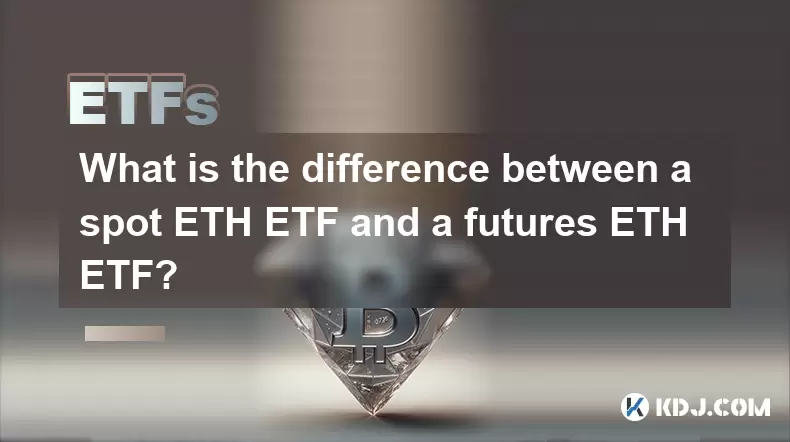
Understanding the Concept of ETH ETFs
An Ethereum Exchange-Traded Fund (ETF) is a financial product designed to track the price of Ethereum (ETH) and trade on traditional stock exchanges. It allows investors to gain exposure to ETH without directly purchasing or holding the cryptocurrency. There are two primary types of Ethereum ETFs: spot ETH ETFs and futures ETH ETFs.
Each type operates differently and has distinct implications for investors, especially in terms of how they derive their value and manage risk.
What Is a Spot ETH ETF?
A spot ETH ETF is directly backed by physical Ethereum assets. This means that the fund holds actual ETH in custody, and its value reflects the real-time market price of Ethereum at any given moment.
- Investors can redeem shares of the ETF for the underlying ETH.
- The ETF’s price closely mirrors the current spot price of ETH.
- These funds typically involve custodianship arrangements with regulated institutions to securely store the digital assets.
Because it's tied directly to the actual asset, a spot ETH ETF provides pure exposure to Ethereum’s price movements without any derivative instruments involved.
What Is a Futures ETH ETF?
Unlike a spot ETF, a futures ETH ETF does not hold actual ETH. Instead, it uses Ethereum futures contracts to track the price of Ethereum. These contracts are agreements to buy or sell ETH at a predetermined price and date in the future.
- The fund rolls over expiring futures contracts into new ones to maintain continuous exposure.
- Its performance may diverge from the spot price due to factors like contango (when futures prices are higher than spot prices) or backwardation (when futures prices are lower).
- Futures ETFs are often more complex and may carry higher tracking errors compared to spot ETFs.
This structure allows for easier regulatory approval in some jurisdictions since it avoids direct ownership of digital assets.
Key Differences Between Spot and Futures ETH ETFs
The differences between these two ETF structures are significant and affect investor outcomes:
- A spot ETH ETF holds actual ETH and mirrors the real-time price of Ethereum, while a futures ETH ETF tracks the price of futures contracts, which may differ from the spot price.
- Rolling costs associated with futures contracts can impact long-term returns in futures-based ETFs.
- Regulatory scrutiny is generally higher for spot ETFs due to the complexities of custody and security of digital assets.
- Liquidity mechanisms differ; spot ETFs rely on the availability of physical ETH for creation and redemption, whereas futures ETFs depend on the liquidity of the futures market.
- Futures ETFs may experience tracking discrepancies during volatile market conditions or when futures markets are in contango or backwardation.
These distinctions influence how each ETF performs under different market scenarios and investor strategies.
Operational Mechanics of Each ETF Type
To understand how each ETF works operationally:
For a spot ETH ETF:
- The issuer purchases and stores ETH through a qualified custodian.
- Authorized participants can create or redeem ETF shares by exchanging ETH for ETF shares (or vice versa).
- The ETF’s net asset value (NAV) is calculated based on the current spot ETH price.
For a futures ETH ETF:
- The issuer invests in Ethereum futures contracts traded on regulated exchanges.
- As contracts approach expiration, the fund sells them and buys contracts with later expiration dates.
- The NAV is determined by the value of the futures positions held, which may not align perfectly with the spot ETH price.
Both mechanisms have pros and cons, particularly in terms of transparency, cost, and alignment with Ethereum’s actual market price.
Tax and Regulatory Considerations
Regulatory agencies treat these ETFs differently:
- In the United States, the Securities and Exchange Commission (SEC) has been cautious about approving spot ETH ETFs, citing concerns around market manipulation and custody risks.
- Futures ETH ETFs have received more favorable treatment because they use regulated futures contracts listed on exchanges like CME Group.
- Tax treatment may vary depending on jurisdiction and the nature of the ETF. For example, in the U.S., futures-based ETFs are often taxed as commodity futures, which have different tax implications than equity-like investments.
Investors should carefully consider the regulatory environment and tax consequences before choosing between the two ETF types.
Frequently Asked Questions (FAQ)
Q1: Can I redeem shares of a futures ETH ETF for actual Ethereum?
No, futures ETH ETFs do not hold physical ETH. Redemption is typically done in cash and based on the value of the futures contracts held.
Q2: Which ETF type better reflects real-time ETH price changes?
A spot ETH ETF more accurately reflects real-time Ethereum price changes because it holds the actual asset.
Q3: Are futures ETH ETFs riskier than spot ETH ETFs?
They carry different risks. Futures ETFs face roll yield risk and potential divergence from the spot price, while spot ETFs face custody and security challenges.
Q4: Why are spot ETH ETFs harder to approve?
Regulators often express concerns about market integrity, manipulation, and the security of digital assets when evaluating spot ETH ETF applications.
Disclaimer:info@kdj.com
The information provided is not trading advice. kdj.com does not assume any responsibility for any investments made based on the information provided in this article. Cryptocurrencies are highly volatile and it is highly recommended that you invest with caution after thorough research!
If you believe that the content used on this website infringes your copyright, please contact us immediately (info@kdj.com) and we will delete it promptly.
- Shiba Inu, Ethereum Classic, and Remittix: Which Crypto Will Dominate?
- 2025-07-19 20:48:26
- TOKEN6900 Presale Heats Up: The Meme Coin to Watch in 2025
- 2025-07-19 20:48:27
- Donkey Kong, Collecting, and Super Mario: A Retro Gaming Resurgence?
- 2025-07-19 20:50:11
- Bitcoin, Nexchain, and Crypto Presales: What's Hot in the NYC Crypto Scene?
- 2025-07-19 20:55:12
- Altcoin Season Incoming? Coins Ready to Explode!
- 2025-07-19 18:30:12
- Dogecoin Price Prediction: Cup and Handle Pattern Points to Potential Breakout!
- 2025-07-19 18:50:11
Related knowledge
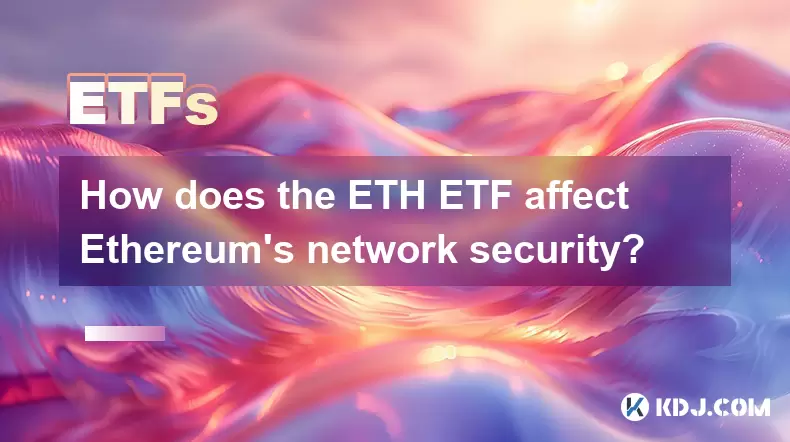
How does the ETH ETF affect Ethereum's network security?
Jul 17,2025 at 01:29pm
Understanding the ETH ETF ConceptAn Ethereum Exchange-Traded Fund (ETH ETF) is a financial product that allows investors to gain exposure to Ethereum ...
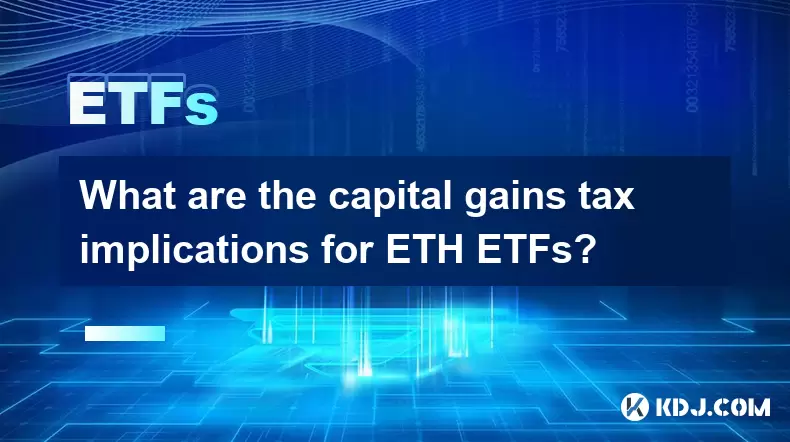
What are the capital gains tax implications for ETH ETFs?
Jul 18,2025 at 08:00am
Understanding Capital Gains Tax in Cryptocurrency InvestmentsCapital gains tax is a tax imposed on the profit realized from the sale of an asset that ...
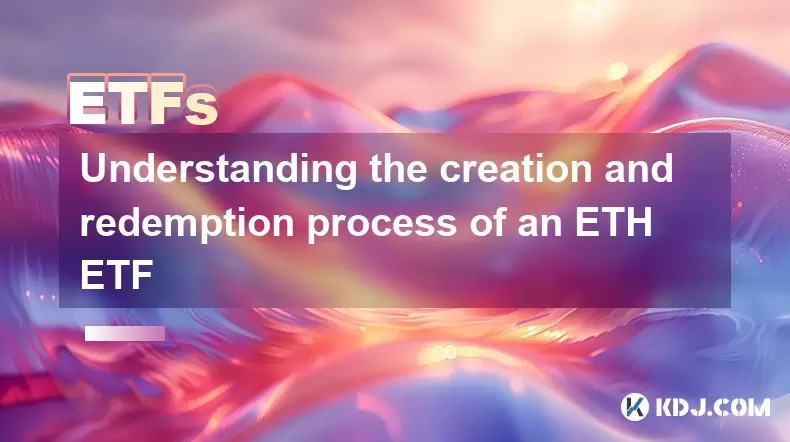
Understanding the creation and redemption process of an ETH ETF
Jul 19,2025 at 07:36am
What is an ETH ETF?An ETH ETF (Ethereum Exchange-Traded Fund) is a financial product designed to track the price of Ethereum without requiring investo...

How to analyze which ETH ETF is the best choice
Jul 19,2025 at 05:01pm
Understanding ETH ETFs and Their RelevanceEthereum Exchange-Traded Funds (ETFs) have emerged as a popular investment vehicle for those seeking exposur...
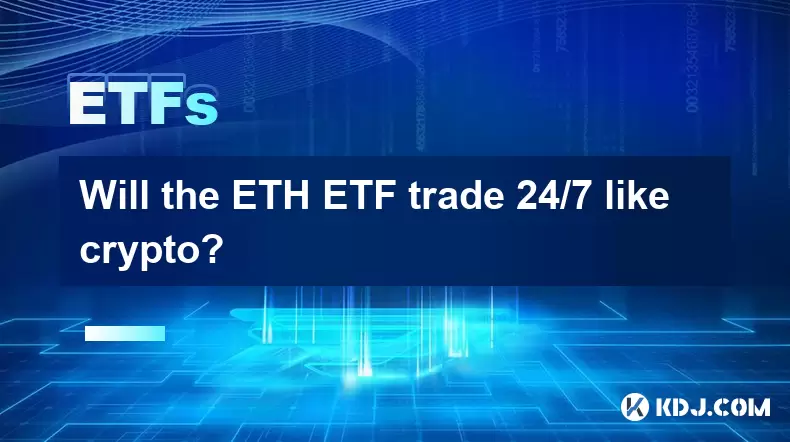
Will the ETH ETF trade 24/7 like crypto?
Jul 18,2025 at 10:00am
Understanding the ETH ETF and Its Trading HoursThe Ethereum Exchange-Traded Fund (ETH ETF) is a financial product that allows investors to gain exposu...
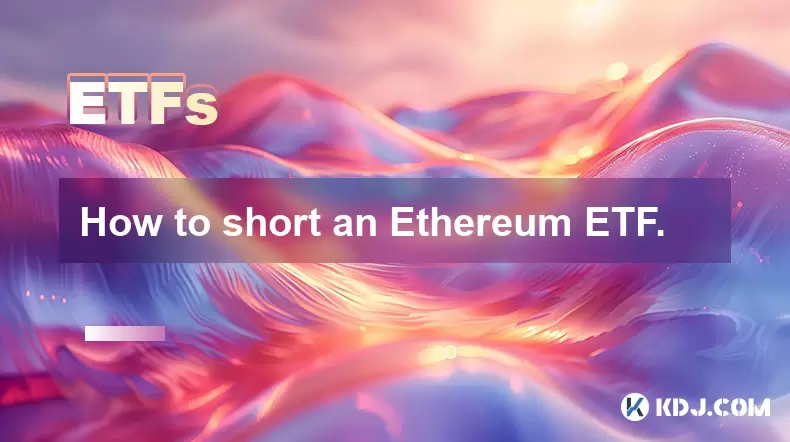
How to short an Ethereum ETF.
Jul 17,2025 at 05:43pm
Understanding the Concept of Shorting an Ethereum ETFShorting an Ethereum ETF involves betting against the price of Ethereum through a specific exchan...

How does the ETH ETF affect Ethereum's network security?
Jul 17,2025 at 01:29pm
Understanding the ETH ETF ConceptAn Ethereum Exchange-Traded Fund (ETH ETF) is a financial product that allows investors to gain exposure to Ethereum ...

What are the capital gains tax implications for ETH ETFs?
Jul 18,2025 at 08:00am
Understanding Capital Gains Tax in Cryptocurrency InvestmentsCapital gains tax is a tax imposed on the profit realized from the sale of an asset that ...

Understanding the creation and redemption process of an ETH ETF
Jul 19,2025 at 07:36am
What is an ETH ETF?An ETH ETF (Ethereum Exchange-Traded Fund) is a financial product designed to track the price of Ethereum without requiring investo...

How to analyze which ETH ETF is the best choice
Jul 19,2025 at 05:01pm
Understanding ETH ETFs and Their RelevanceEthereum Exchange-Traded Funds (ETFs) have emerged as a popular investment vehicle for those seeking exposur...

Will the ETH ETF trade 24/7 like crypto?
Jul 18,2025 at 10:00am
Understanding the ETH ETF and Its Trading HoursThe Ethereum Exchange-Traded Fund (ETH ETF) is a financial product that allows investors to gain exposu...

How to short an Ethereum ETF.
Jul 17,2025 at 05:43pm
Understanding the Concept of Shorting an Ethereum ETFShorting an Ethereum ETF involves betting against the price of Ethereum through a specific exchan...
See all articles

























































































